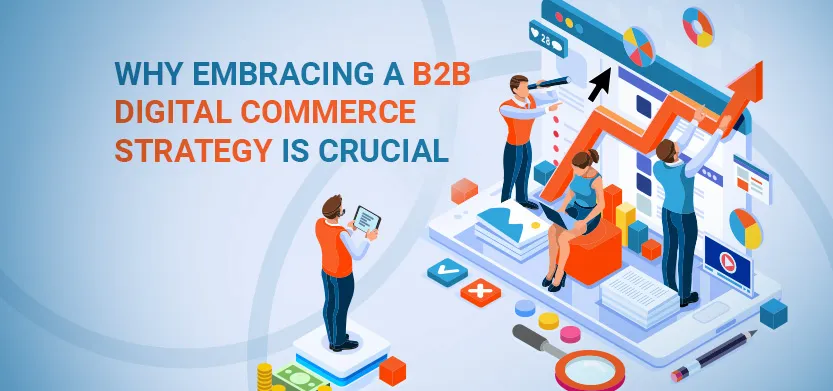

Author
Laura Meshen
, Content Marketing Specialist
Posted in Digital Commerce, Software & Development
January 12, 2021
Why Embracing a B2B Digital Commerce Strategy is Crucial
B2B digital commerce will be one of the largest areas of ecommerce growth from 2020 to 2025. Is your organization ready to be part of the expected $24.3 Trillion in global revenue it will generate?
What are the benefits of a B2B digital commerce strategy?
The traditional sales channels for established, mature B2B companies have disrupted over the last few years. Why? There are new, younger faces running the show and making the decisions.
MILLENNIALS ARE THE NEW PURCHASING DECISION-MAKERS
“73% of millennials are involved in product or service purchase decision-making at their companies. Approximately one-third of millennials report being the sole decision-maker for their department. Significantly more male millennials report being the sole decision-maker as compared to female millennials. “ Merit’s Millennial B2B Report
According to Gartner’s The Future of Sales ebook, 44% of millennials do not want to talk to sales reps. Companies that already offer digital and ecommerce options are reaping the early rewards. Plain and simple, the B2B buyers are looking to businesses with ecommerce sites first.
Gartner’s research also found that 75% of manufacturers, distributors and wholesalers who don’t currently have an ecommerce site plan to launch one within two years. That means B2B companies not planning on adopting a digital commerce strategy risk being left behind. Competitors that offer digital solutions to the traditional sales process will give B2B buyers an easy reason to shift their allegiances. This will lead to lost sales and revenue for companies that don’t digitize.
Benefits of B2B Digital Commerce
Improved return on investment
Investment in digital commerce for B2B companies comes with high expectations. Fortunately, it also comes with the potential to generate a better return on investment (ROI) than other sales channels. The figure below shows ecommerce as the most important sales channel for B2B respondents over the next five years. The same figure also shows that ecommerce has the best ROI of all sales channels today.
Optimized costs and efficiency
Beyond ROI, a digital strategy for B2B can optimize costs and increase efficiency through order automation and reduced cost of service. Improved product delivery and transparency of order status will improve the customer experience. Accurate pricing, ease of reordering and shorter sales cycles will also benefit the customer relationship.
Revenue growth
B2B organizations that implement an ecommerce strategy can potentially grow revenue through increased order values, new and improved service offerings, Internet of Things (IoT) integrations, event-based revenue opportunities, subscription models, new accounts and new geographies.
Improved customer experience
Improved customer experience through tailored customer offerings, improved customer communication, product findability, complex product ordering and mobile-friendly offerings will also give B2B organizations a competitive edge over those that hesitate to make the move to ecommerce.
Digital is the way forward
At the end of the day, change is inevitable. For B2B, that means moving sales processes and assets to a format that new, younger, digital-savvy buyers are willing to use. But, that movement also opens up a lot of opportunities for B2B suppliers, manufacturers and vendors to better serve their clients while generating operational efficiencies.
We hope that this has given you some food for thought. If you want to know more about how to develop a B2B digital strategy, you can check out our related blog here.
Or, if you aren't part of the 44% and would like to chat with someone, our ecommerce consultants are always ready to lend a hand and our expertise. Reach out today to talk about digital commerce strategy for your B2B business.
Author
Laura Meshen
, Content Marketing Specialist
Posted in Digital Commerce, Software & Development
January 12, 2021
